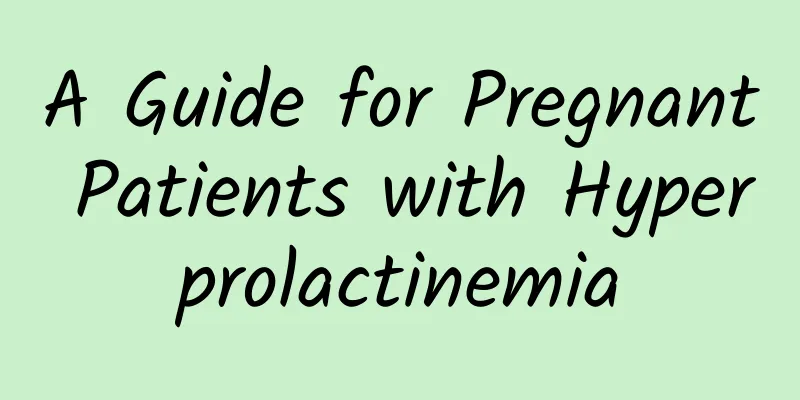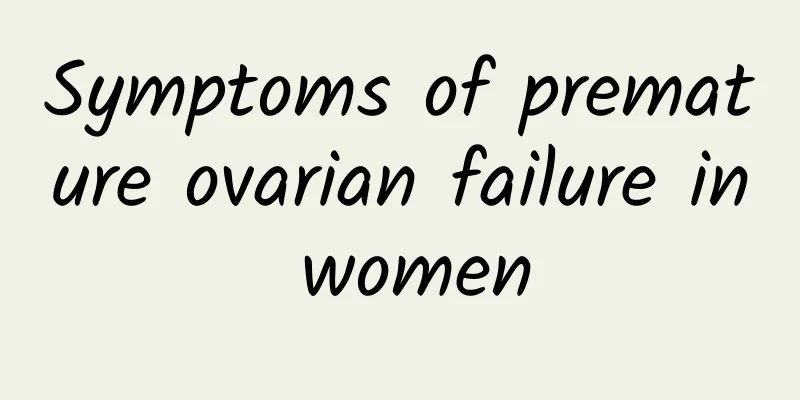How to regulate irregular menstruation after childbirth 5 tips to deal with irregular menstruation

|
What should I do if I have irregular menstruation after childbirth? The mother's body has not fully recovered after childbirth. It is normal to have temporary menstrual disorders. Therefore, mothers should not worry too much. Let's take a look at 5 tips to deal with irregular menstruation after childbirth. What to do if you have irregular menstruation after childbirth? 5 ways to easily deal with your period: 1. Exercise is the most effective way to regulate menstruation First of all, mothers, please develop the habit of exercising, which can enhance physical strength and promote blood circulation. Irregular menstruation may affect women's normal life and may also cause back pain. Many women have always misunderstood that they cannot exercise if they have irregular menstruation or discomfort during menstruation. In fact, on the contrary, proper exercise can improve the symptoms of irregular menstruation and adjust the menstrual rhythm. 2. Use menstrual regulation patch If postpartum mothers unfortunately experience symptoms of irregular menstruation, they don’t have to worry too much. They can use menstrual regulating patches to regulate their menstruation. Menstrual regulating patches can replenish qi and blood, regulate menstruation and stop leucorrhea, etc. There are also some medicines for intellectual menstrual disorders that can be used for regulation, but you should choose the medicine according to your own situation, and it is best to follow the doctor's prescription to avoid adverse reactions. 3. Get rid of bad living habits Many bad living habits can also lead to irregular menstruation, such as irregular work and rest time, greed for coolness, frequent consumption of supplements, clubbing and fast food, excessive dieting and addiction to tobacco and alcohol, abnormal emotions, great stress, drug abuse, etc. Therefore, postpartum mothers should not stay up late to avoid affecting physiological rhythms and endocrine coordination. Cold stimulation during menstruation can cause excessive contraction of blood vessels in the pelvic cavity, which can cause oligomenorrhea or even amenorrhea. Therefore, mothers should have a regular daily life, avoid overwork, and especially avoid cold and dampness during menstruation. In addition, some mothers diet excessively, and due to insufficient energy intake, a large amount of fat and protein in the body is consumed, resulting in estrogen synthesis disorders and obvious deficiency, affecting menstruation, or even scanty menstruation or amenorrhea. Therefore, women who pursue a slim figure must not diet blindly. Therefore, postpartum mothers should do the following during menstruation: keep warm and avoid moisture, avoid rain, wading, swimming, drinking cold drinks, etc., especially prevent the lower body from getting cold and keep warm. As long as you pay more attention in your daily life and have regular gynecological examinations, you will not suffer from irregular menstruation and other diseases. Paying attention to your health will make your life more quality. 4. Keep a good mood Keep your emotions calm, as tension and anxiety can also cause ovarian dysfunction. Depression or frustration often leads to a decrease in menstrual flow or even amenorrhea, while tension can increase menstrual flow and bring on menstruation earlier. Long-term mental depression, sulking, or severe mental stimulation and psychological trauma can all lead to menstrual disorders, dysmenorrhea, or amenorrhea. Mothers' menstrual cramps and menstrual disorders are regulated by the hypothalamus-pituitary-ovarian axis. The hypothalamus is connected to the central nervous system, receives external stimuli, and after integration, affects the function of the hypothalamus-pituitary-ovarian axis. Any change in any part of these links will affect ovarian function and cause menstrual disorders. Mental factors such as excessive mood swings, tension, and large changes in the environment or peripheral temperature cause dysfunction between the central nervous system and the hypothalamus-pituitary gland, affecting the secretion of gonadotropin, causing follicle maturation and ovulation disorders, thereby causing menstrual disorders and even amenorrhea. This is because menstruation is caused by the stimulation of the endometrium by hormones secreted by the ovaries, and the hormones secreted by the ovaries are controlled by the release of hormones from the pituitary gland and hypothalamus. Therefore, any abnormality in the function of the ovaries, pituitary gland, or hypothalamus will affect menstruation. Keep a good mood. Depression and tension can lead to irregular menstruation. Participate in more activities, but don't overwork. In short, to have a smooth menstruation, you need to pay attention to diet and lifestyle while taking medication. 5. Learn to massage yourself to relieve pain The treatment of menstrual problems should focus on regulating the spleen and stomach and replenishing the Chong and Ren meridians, so that the menstrual problems will naturally be solved. Doing more self-massage can relieve the symptoms of irregular menstruation. |
<<: How to regulate irregular menstruation? Try these four dietary treatments
Recommend
Do you need to pull the carrots? Nutritionist teaches slimming tips
Many people ask nutritionists how to slim down th...
Symptoms of acute pelvic inflammatory disease
Pelvic inflammatory disease is a type of gynecolo...
What are the treatments for uterine fibroids?
What are the treatments for uterine fibroids? Ute...
Experts explain the two causes of pelvic inflammatory disease
Pelvic inflammatory disease is a manifestation of...
Introduction to the best treatment for ectopic pregnancy
Ectopic pregnancy brings a lot of unspeakable pai...
What foods should not be eaten for uterine fibroids? What should patients with uterine fibroids pay attention to in their diet?
At present, there are many ways to treat uterine ...
The difference between adenomyosis and endometriosis
Adenomyosis and endometriosis are two different g...
How much does a uterine fluid test cost?
Many female patients want to know the cost of tre...
Understand the early symptoms of cervicitis and prevent it early
What are the early symptoms of cervicitis? The ce...
Can I still get pregnant after uterine fibroid surgery? Is uterine fibroid a malignant tumor?
Uterine fibroids are a very common uterine diseas...
Three major hazards of threatened abortion to women
Many pregnant women do not know they are pregnant...
Lose weight with just 3 minutes of high-intensity exercise per week
No time to go to the gym, too tired to move after...
What causes adnexitis in women?
Adnexitis mainly refers to the inflammation cause...
Treatment of vaginal candidiasis
Treatment of vaginal candidiasis: If candidal vag...
What does a weak positive ovulation test paper mean before menstruation?
Normal women of childbearing age have menstruatio...









